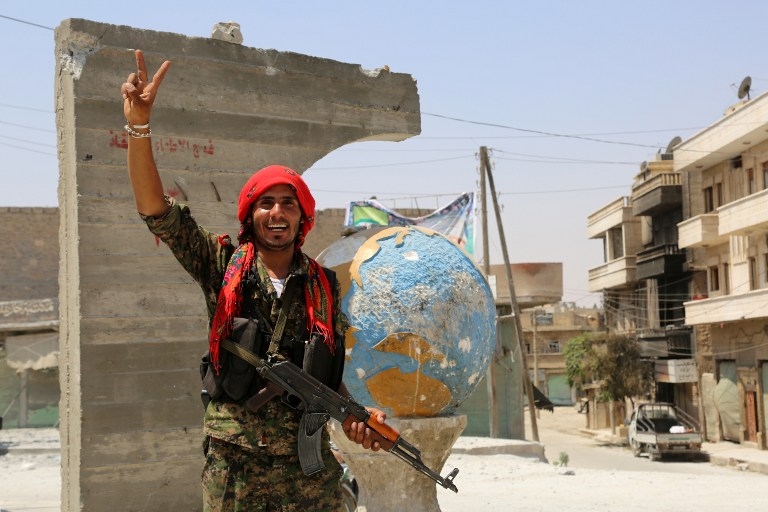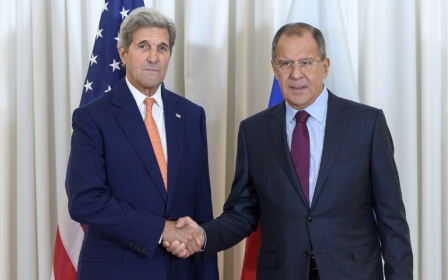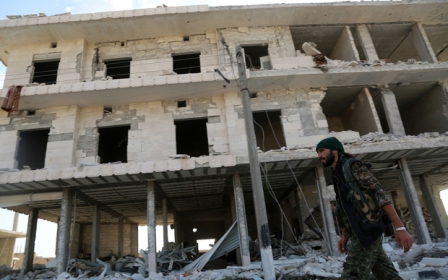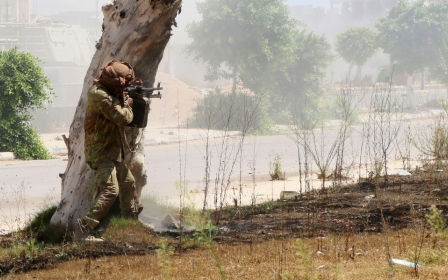IS's defeat and the imminent power vacuum: What can the international community do?

In the first six months of 2016, the self-proclaimed Islamic State (IS) lost 12 percent of the territory it controlled, including the Iraqi cities of Ramadi and Fallujah, according to an analysis conducted by the Conflict Monitor team of IHS.
In July and August 2016, the group continued to lose territory: in early August 2016, the militiamen of the United Nations-supported government in Libya seized the coastal city of Sirte, IS’s stronghold in North Africa. Days later, US-backed Syrian opposition fighters recaptured the city of Manbij in Syria.
As IS’s losses reveal, the group is losing battlefield momentum at an increasing rate, a factor that will accelerate its gradual defeat as a conventional armed force.
Given the complex religious and ethnic contexts in Syria and Iraq, governance and social cohesion will be challenging in the aftermath of the group’s military defeat.
Yet the international community lacks a comprehensive political strategy for the so-called post-IS era – as it did following the 2003 US-led invasion of Iraq – risking the creation of a new political and security vacuum that might generate new religious and ethno-sectarian conflicts in the Middle East and North Africa region.
A symptom, but not the disease
Throughout its evolution, IS has capitalised on the political and security voids that have followed the collapse of fragile Middle Eastern and North African nation-states.
In 1999, Jordanian national Abu Musab al-Zarqawi founded Jama’at al-Tawid wal-Jihad or the Organisation of Monotheism and Jihad, an entity that initially aimed at overthrowing the Hashemite monarchy in Jordan, a politically stable country with reliable security services.
The group operated underground until 2003, when al-Zarqawi benefited from the lawless environment that ensued following the fall of Saddam Hussein’s regime in Iraq.
Then, al-Zarqawi forged an operational alliance with the leaders of Sunni insurgent cells in Iraq– most of them composed of former members of the disbanded Iraqi security services - and, on 17 October, 2004, pledged alliance to Osama Bin Laden’s al-Qaeda, changing the name of his organisation to al-Qaeda in Iraq (AQI).
Two years later, AQI merged with other Sunni insurgent groups in Iraq, and formed the Mujahideen Shura Council. This umbrella organisation was later replaced by the Islamic State of Iraq (ISI), led by Ibrahim Awad al-Badri – better known by his nom de guerre: Abu Bakr al-Baghdadi.
In April 2013, ISI transformed itself into the Islamic State of Iraq and the Levant (ISIL). The group profited from the chaos that followed the uprising against the regime of Syrian President Bashar al-Assad in 2011, and, as in Iraq, on Sunni disenfranchisement.
On 29 June, 2014, Baghdadi established the self-proclaimed Islamic State (IS), claiming exclusive political and theological authority over the world’s Muslims – despite the fact that the majority of Muslims do not sympathise with the group’s ideology, nor with its violent tactics.
IS rapidly expanded the area under its control in Iraq and Syria. It must be noted, however, that although the group’s military offensives were successful, these offensives were directed against failed states with weakened militaries. Again, the group took advantage of political and security voids.
Moreover, IS easily created a network of affiliated armed groups in North Africa, with a stronghold in oil-rich Libya, which has been immersed in violent political divisions since the fall of the regime led by dictator Muammar Gaddafi.
As in Iraq and Syria, IS’s presence in North Africa is a symptom of a disease: the collapse of fragile nation-states, and the emergence of political and security vacuums.
Can the international community ensure that IS’s military defeat does not lead to new power and security vacuums?
A post-IS era comprehensive strategy
Currently, US-led coalition-backed Iraqi forces are preparing to liberate Mosul, which is IS’s stronghold in Iraq.
Unfortunately, this soon-to-be military victory – as every coalition victory on the battlefield – will generate a humanitarian crisis.
Is there a plan to provide humanitarian relief, reconstruction, and government services to the people of Mosul once their city is IS-free?
On 20-21 July, 2016, defence and foreign ministers from 24 countries met in Washington at a Pledging Conference in Support of Iraq, and raised more than $2.1bn in aid, surpassing the estimated $2bn organisers had expected.
Nevertheless, while there is strong international support for Iraq, there is no actual political solution for the newly liberated areas there, nor a central authority in Syria to govern the areas that were previously under IS control.
In the absence of a comprehensive solution, violent chaos will surely ensue in the region.
To avoid winning a battle that will only soon trigger another, the design and implementation of a comprehensive political strategy that addresses the underlying circumstances that gave raise to IS – including Sunni disenfranchisement – is urgently needed.
Now is the time to discuss if a united Iraq is a feasible project, and, if so, whether it is or not possible to reach an agreement that equitably divides territorial control between the Kurdish, the Sunni and the Shia communities of Iraq.
In a recent interview, Masrour Barzani, head of the KRG Security Council and son of KRG President Massoud Barzani, stated: "Federation has not worked, so it [the political solution] has to be either confederation or full separation."
In support of a confederated Iraq, he added: “If we have three confederated states [a Kurdish state, a Sunni state, and a Shia state] we will have equal three capitals, so one is not above the other.”
The Kurdistan Regional Government (KRG), de juris an autonomous region of Iraq, is an entity already. It has its own political structures and a military force – the Peshmerga, who has proven to be one of Iraq’s reliable fighting forces against IS.
However, there are no Sunni and Shia entities, and demarcating their boundaries could trigger a new wave of strife: unlike the Iraqi Kurdish population, which is concentrated in the north and northeast of Iraq, Iraqi Sunni and Shia communities are dispersed all over the country.
The reality on the ground is complex, and so will be the process to design and implement a political solution.
Furthermore, now is also the time to start investing further diplomatic capital in Syria, and to encourage Russia – a permanent member of the United Nations Security Council (UNSC), and the closest ally of the Syrian regime led by President Bashar al-Assad – to focus on a post-IS Syrian state–building project.
Achieving a political solution for Iraq will not constitute an actual victory if neighbouring Syria is in a shambles. The objective is regional stability.
The successful design and implementation of a post-IS comprehensive political strategy for Iraq and Syria will ultimately determine whether or not the aftermath of IS’s military defeat will be an actual victory.
The time to start designing and implementing such a strategy is now.
- Tania Ildefonso Ocampos is a Spanish political analyst who specialises in EU strategy in the Middle East. She is a former Schuman trainee (Euro-Med and Middle East Unit of the European Parliament's Directorate-General for External Policies), and holds an MA in Middle Eastern History from Tel Aviv University, Israel.
The views expressed in this article belong to the author and do not necessarily reflect the editorial policy of Middle East Eye.
Photo: A member of Syrian Democratic Forces (SDF), flashes the sign of victory in the northern Syrian town of Manbij on 14 August, 2016 more than a week after the SDF, an Arab-Kurdish alliance, pushed the Islamic State (IS) group out of the city.
New MEE newsletter: Jerusalem Dispatch
Sign up to get the latest insights and analysis on Israel-Palestine, alongside Turkey Unpacked and other MEE newsletters
Middle East Eye delivers independent and unrivalled coverage and analysis of the Middle East, North Africa and beyond. To learn more about republishing this content and the associated fees, please fill out this form. More about MEE can be found here.





